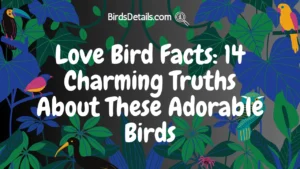Have you ever heard a bird talk? How about a sun conure or other parrots like the African Grey? These colorful birds are known for their impressive voices and talking ability, making them popular pets among bird enthusiasts. A recent poll showed that many people prefer parrots over other types of pets because of their unique ability to communicate with humans. But what makes these little creatures such great talkers?
Sun conures are a species of parrot with a unique personality that sets them apart from other types of birds. They have an incredible capacity for speech and voice, and with dedication and the right environment, they can learn to mimic human speech patterns and even entire phrases. Despite their popularity among pet owners, the population of sun conures in the wild is declining, making it crucial to ensure their conservation efforts to protect their lives.
| Facts | |
|---|---|
| Sun conures are not known for their talking ability. While they can learn to mimic some words and phrases, they are not as good at it as some other parrot species, such as African grey parrots. | |
| Sun conures are very social birds and they love to be around people. This makes them good candidates for training, but it also means that they can be noisy if they are not properly socialized. | |
| If you are considering getting a sun conure as a pet, it is important to be aware of their talking ability and their need for socialization. If you are not prepared to put in the time and effort to train and socialize your sun conure, it may not be the right bird for you. | |
| There are some things you can do to encourage your sun conure to talk. These include talking to them regularly, repeating words and phrases that you want them to learn, and providing them with a stimulating environment. | |
| It is important to be patient when training your sun conure to talk. It may take some time for them to learn, but with patience and consistency, they can learn to say a few words or phrases. |
In this post, we will explore the talking ability of sun conures in more detail. We’ll share tips on how they learn to talk, what factors influence their speech patterns, and how their abilities compare to other species of parrots. Additionally, we’ll discuss how to adjust the volume and toning of their speech and even conduct a poll on which words they are most likely to pick up. So sit back, relax, and prepare to be amazed by these talented talkers!
Can Sun Conures Talk? Answering the Question
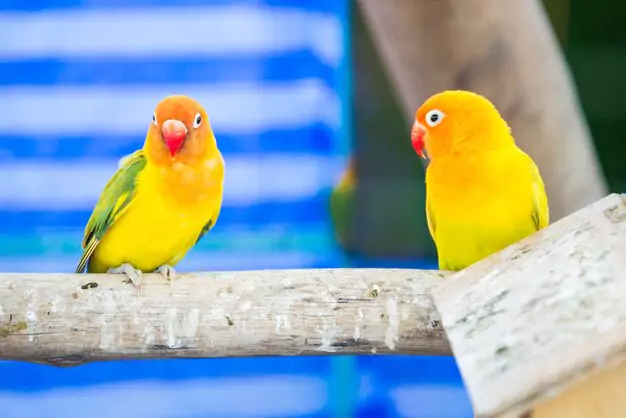
Sun conures, like other parrots, are one of the most popular pet birds due to their vibrant colors and playful personalities. One tip to train your sun conure to talk is to repeat words or phrases frequently. While not all sun conures will learn to talk, some may surprise you with their ability to mimic sounds and even give kisses.
Factors That Affect Talking Ability
The ability of sun conures and other parrots to speak depends on various factors such as age, sex, genetics, and ear structure. Here are some of the factors that affect a sun conure’s talking ability:
Age
Younger sun conures have better chances of learning how to talk compared to older ones. This is because younger birds have more flexible vocal cords and can easily mimic sounds.
Genetics
Just like humans, some birds are naturally gifted with exceptional ears for mimicking human speech. Some species may have better ears for picking up and reproducing sounds than others due to genetic differences.
Sex
Male sun conures tend to be better at talking than females. This is because male birds are generally more vocal than females.
Environment
The environment in which a bird lives can also affect its ability to talk. If a bird lives in an environment with loud noises such as traffic or construction work, it may find it difficult to hear and mimic human speech.
Training Your Sun Conure To Talk
If you want your sun conure to learn how to talk, there are several things you can do:
- Start Early: The earlier you start training your bird, the better chance it has of learning how to speak.
- Repeat Words: Repeat words or phrases frequently so that the bird hears them often.
- Use Positive Reinforcement: Reward your bird with treats or praise when it repeats words correctly.
- Be Patient: Learning how to speak takes time and patience; don’t give up if your bird doesn’t learn right away.
- Speak Clearly: Speak clearly and slowly, so that your bird can hear and mimic the words correctly.
Factors Affecting Sun Conure Talking Ability

Sun conures are known for their vibrant colors, playful personalities, and impressive talking abilities. However, not all sun conures have the same level of talking ability, and several factors can impact their speech development.
Genetics Play a Role in a Sun Conure’s Talking Ability
Just like with humans, genetics can play a role in a sun conure’s ability to talk. Some birds may have a genetic predisposition towards being more vocal or having better mimicry skills than others. However, genetics alone do not determine a bird’s talking ability.
Early Socialization and Exposure to Human Speech Can Impact Their Ability to Talk
Early socialization is crucial for developing a sun conure’s talking skills. Birds that are exposed to human speech from an early age are more likely to pick up words and phrases. This is because they learn through imitation and repetition.
Owners should start exposing their sun conures to human speech as soon as possible by talking to them regularly in a calm and soothing voice. Reading books aloud or playing music with lyrics can also help stimulate their learning.
The Individual Personality of Each Bird Can Affect Their Willingness to Learn and Communicate Through Speech
Like humans, each bird has its unique personality traits that can affect its willingness to learn new things. Some birds may be more curious or outgoing than others, making them more eager to learn new words and sounds.
On the other hand, some birds may be shy or easily frightened, which could make it harder for them to feel comfortable enough to vocalize around humans. Owners should take the time to get to know their bird’s personality so they can tailor their training methods accordingly.
Consistent Training Is Crucial for Developing a Sun Conure’s Talking Skills
Consistency is key. Owners should set aside time each day to work with their birds, using positive reinforcement techniques like treats and praise to encourage them.
It’s important to start with simple words or phrases and gradually build up to more complex ones. Repetition is also key, so owners should repeat the same words or phrases multiple times throughout the day.
Owners should be patient and not get discouraged if their bird doesn’t start talking right away. Some birds may take longer than others to develop their speech skills, but with consistent training and positive reinforcement, most sun conures can learn how to talk.
Training Your Sun Conure to Talk: Tips and Tricks
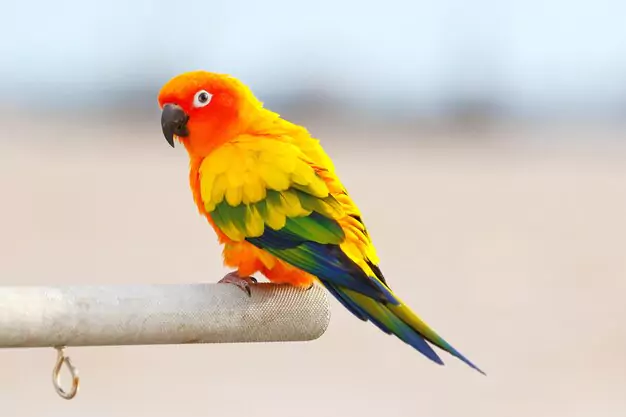
If you’re one of the many conure owners in the parrot world, you may be wondering how to train your sun conure to talk. While not all birds are capable of learning human words and phrases, with patience and positive reinforcement techniques, your sun conure can learn a variety of vocabulary.
Start with Simple Words or Phrases
When training your sun conure to talk, it’s important to start with simple words or phrases. Begin by using short, easy-to-pronounce words such as “hello,” “goodbye,” or “hi.” Once your bird has mastered these basic words, you can move on to more complex vocabulary.
Repeat Words or Phrases Frequently
Repetition is key. Repeat words or phrases frequently throughout the day so that your bird has ample opportunity for practice. You can also try toning the pitch of your voice when speaking certain words or phrases. This will help your bird differentiate between different sounds and tones.
Use Positive Reinforcement Techniques
Positive reinforcement is an effective way to encourage good behavior in any animal, including birds. When your son conure to make progress in speaking, use treats or praise as a reward. This will reinforce their behavior and encourage them to continue practicing their vocabulary.
Be Patient
Learning to speak takes time and effort for both humans and animals alike. It’s important to be patient with your birds as they learn new words and phrases. Don’t get frustrated if they don’t pick up on something right away – just keep practicing!
Build Vocabulary with Phrases
In addition to individual words, teaching phrases can also be helpful when training your sun conure to talk. For example, you could teach them how to say “I love you” or “Give me a kiss.” These types of phrases not only expand their vocabulary but also allow for more interaction between you and your bird.
Practice with Flock Members
Birds are social creatures, and they often learn from one another. If you have other birds in your household, try practicing speaking with them as well. Your sun conure may be more likely to pick up on certain words or phrases if they hear them being used by their flock members.
Covault Them
If you’re having trouble training your sun conure to talk on your own, consider enlisting the help of a professional trainer. They can provide additional tips and techniques for teaching your bird new words and phrases.
Best Practices for Teaching Your Sun Conure to Talk
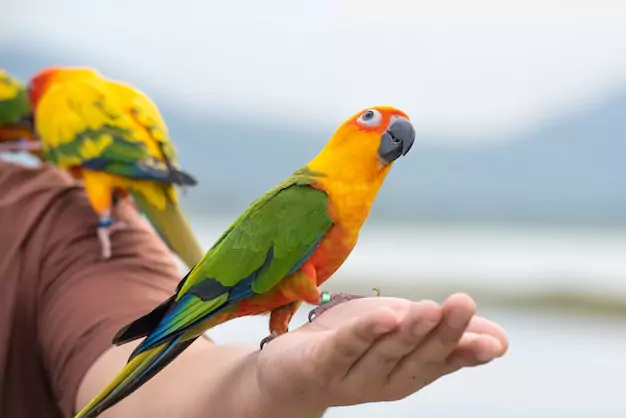
Create a Quiet Environment Free from Distractions During Training Sessions with Your Bird
One of the most important things you can do is create a quiet and distraction-free environment during training sessions. This means choosing a time when your bird is well-rested and alert and finding a quiet space where you won’t be interrupted.
Once you’ve found the perfect spot, make sure that there are no loud noises or distractions that could interfere with your bird’s ability to focus on learning new words or phrases. Turn off any music or television in the background and ask other members of your household to keep noise levels down while you’re working with your bird.
Speak Clearly and Slowly When Teaching New Words or Phrases
When teaching new words or phrases to your sun conure, it’s important to speak clearly and slowly so that your bird can understand what you’re saying. Use simple language at first, starting with short sentences or phrases before moving on to more complex language structures.
Repeat each word or phrase several times in a calm and patient tone of voice, giving your bird plenty of time to process what you’re saying. It may take some time for your sun conure to start repeating the words back to you, but with patience and consistency, they will eventually start picking up new vocabulary.
Use Short Sentences or Phrases at First Before Moving Onto More Complex Language Structures
As mentioned earlier, starting with short sentences or phrases is key when teaching your son conure how to talk. This allows them time to get used to the sound of human speech without getting overwhelmed by too much information at once.
Once they have mastered basic vocabulary like “hello” and “goodbye,” gradually introduce longer sentences and more complex language structures. Keep in mind that every bird learns at their own pace, so be patient and don’t rush the process.
Make Sure That You Use Consistent Vocabulary When Communicating with Your Bird
Finally, it’s important to use consistent vocabulary when communicating with your sun conure. This means using the same words and phrases consistently so that your bird can begin to associate certain sounds with specific meanings.
For example, if you always say “hello” when you greet your bird in the morning, they will eventually learn to associate that sound with a friendly greeting. Similarly, if you consistently use the word “treat” when offering your bird a snack, they will quickly learn what that word means and start getting excited whenever they hear it.
When Do Sun Conures Start Talking? A Timeline
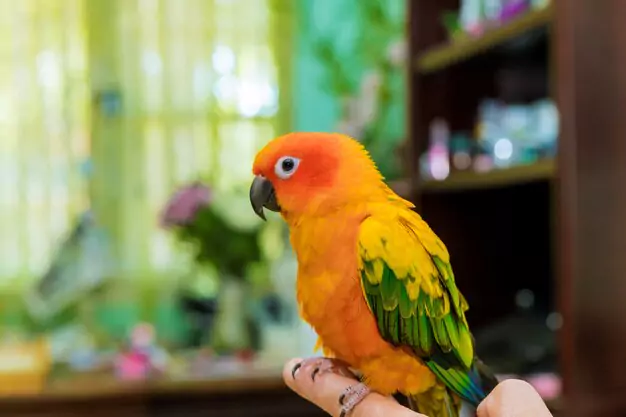
Most Sun Conures Start Mimicking Sounds and Words Between 6 Months to a Year Old
Sun conures are known for their vibrant colors, playful personalities, and impressive talking abilities. These birds can mimic sounds and words, making them a popular choice among bird enthusiasts. If you’re considering getting a sun conure as a pet, one of the questions you might be asking is when do they start talking?
On average, most sun conures start mimicking sounds and words between 6 months to a year old. This is when they go through their first molt and reach sexual maturity. During this time, they become more vocal and begin to explore their surroundings.
However, it’s important to note that not all sun conures follow this timeline. Some may start speaking earlier or later than others depending on various factors such as genetics, environment, and training.
Consistent Training Can Help Speed Up the Process of Learning to Talk
If you want your son to continue to learn how to talk faster or expand his vocabulary, consistent training is key. Spend time with your bird every day and talk to it in a clear voice. Repeat words or phrases you want your bird to learn consistently.
You can also use positive reinforcement techniques such as giving treats or praise when your bird repeats certain words correctly. This will encourage your bird to continue learning new words.
It’s important not to rush your bird’s learning process though. Each bird has its own pace of learning, so be patient and persistent with your training efforts.
It’s Important To Be Patient And Not Rush Your Bird As Each Individual Bird Has Their Own Pace Of Learning
Patience is key. Don’t get frustrated if your bird doesn’t pick up on certain words right away – remember that each bird has its own pace of learning.
Instead, focus on consistent training and positive reinforcement techniques. Spend time with your bird every day and talk to it in a clear voice. Repeat words or phrases you want your bird to learn consistently and reward it when it gets things right.
You can also try playing recordings of other birds talking or singing to encourage your bird to mimic sounds and words. Just be sure to supervise your bird while doing this, as some recordings may include harmful or inappropriate language.
Golden Conures: Do They Have the Same Talking Ability as Sun Conures?
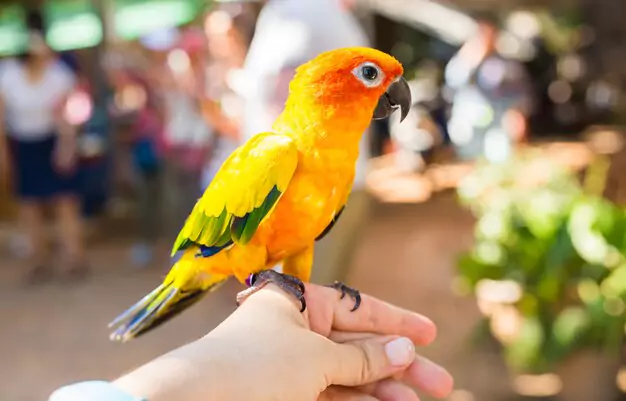
Sun conures are known for their talking ability, but what about golden conures? These two types of birds have a lot in common, including their vibrant colors and playful personalities. But do they share the same skills? Let’s find out.
Golden conures are also known for their talking ability.
While sun conures may be more well-known for their talking ability, golden conures are also capable of learning to speak. These birds are highly intelligent and love to mimic the sounds they hear around them. With consistent training and effort, a golden conure can learn to say a variety of words and phrases.
However, they may have a slightly different tone or pitch compared to sun conures when speaking.
One thing that sets golden conures apart from sun conures is their unique vocalizations. While both types of birds can learn to speak words and phrases, the way they sound when doing so may differ. Some owners have noted that golden conures tend to have a slightly lower pitch or more melodic tone than sun conures when speaking.
The talking ability of golden conures is affected by similar factors as sun conures such as genetics and training.
Just like with sun conures, genetics play a role in a golden conure’s ability to talk. Some birds simply have a natural talent for mimicking sounds while others may struggle more with this skill. Training is key. Consistency and patience are crucial in helping your bird learn new words and phrases.
With consistent effort, both types of birds can learn to speak.
The good news is that with enough time and dedication, both sun and golden conures can become skilled talkers. Here are some tips for teaching your bird how to talk:
- Start with simple words and phrases. Begin by repeating easy words like “hello” or “goodbye” to your bird multiple times a day.
- Use positive reinforcement. When your bird says a word correctly, reward them with treats or praise.
- Repeat, repeat, repeat. Consistency is key. Keep practicing the same words and phrases until your bird has mastered them before moving on to something new.
- Be patient. Not all birds will learn at the same pace, so don’t get discouraged if your bird takes longer than expected to start talking.
- Have fun! Teaching your bird how to talk should be an enjoyable experience for both you and your feathered friend.
Understanding the Talking Ability of Sun Conures
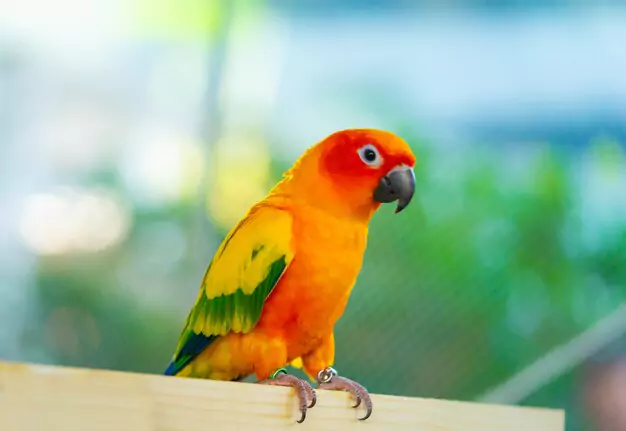
Beyond Mimicking: The Vocalizations of Sun Conures
Sun conures are known for their talking ability, but their vocalizations go beyond just mimicking human speech. In their natural habitat, sun conures use various sounds and calls for communication purposes such as warning each other of predators or signaling food sources. As pets, they may also use these sounds to express happiness, excitement, or distress.
It’s important to note that not all sun conures will learn to talk, and even those that do may have varying levels of proficiency. However, it’s still worth paying attention to your bird’s vocalizations as they can reveal a lot about their mood and needs.
Socialization Through Speech
Learning to speak is a form of socialization for pet sun conures. By imitating human speech, they can bond with their owners and feel like part of the family. It’s important to interact with your bird regularly and encourage them to talk by repeating words and phrases frequently.
In addition to speaking, sun conures also enjoy whistling tunes or making other noises such as clicking or chirping. These sounds can be used as a way of bonding with your bird even if they don’t learn any actual words.
Improving Communication Between You and Your Pet
Understanding the nuances of your bird’s vocalizations can help improve communication between you and your pet. By paying attention to the context in which certain sounds are made, you can better understand what your bird is trying to communicate.
For example, if your sun conure makes a loud screeching noise when you leave the room, it could be a sign that they are feeling anxious or upset about being left alone. On the other hand, if they make soft cooing noises while snuggling up against you, it could be a sign that they are feeling content and happy.
Here are some tips for improving communication with your sun conure:
- Spend time interacting with them every day, even if it’s just talking to them or whistling a tune.
- Pay attention to their body language as well as their vocalizations. Are they fluffed up and quiet, indicating that they are feeling ill or scared? Or are they active and alert, indicating that they are feeling playful?
- Repeat words and phrases frequently to encourage your bird to learn new vocabulary.
- Use positive reinforcement such as treats or praise when your bird makes an effort to communicate with you.
Conclusion: Understanding the Talking Ability of Sun Conures
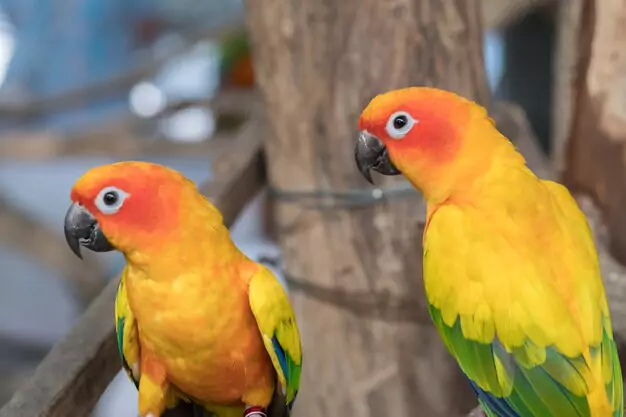
In conclusion, sun conures can talk and can be trained to do so with patience and consistency. Factors such as age, gender, and individual personality can affect their talking ability. By following best practices for teaching your son conure to talk and starting training at an early age, you can increase the likelihood of success.
It’s important to remember that not all sun conures will have the same level of talking ability, and some may never learn to talk at all. However, with dedication and effort on your part, you can help your bird reach its full potential.
If you’re interested in teaching your sun conure to talk, consider seeking guidance from a professional trainer or avian behaviorist. They can provide personalized tips and advice based on your bird’s individual needs.
Remember to always prioritize the health and well-being of your bird above its talking ability. With proper care and attention, your sun conure will thrive as a beloved companion for years to come.
FAQs
1. Can all sun conures learn how to talk?
No, not all sun conures will have the same level of talking ability or may never learn how to talk at all due to factors such as age, gender, and individual personality.
2. At what age should I start training my sun conure to talk?
It is recommended that you start training your son conure at an early age when they are still young enough to pick up new skills easily.
3. How often should I train my sun conure?
Consistency is key. Short but frequent training sessions every day are more effective than longer sessions less frequently.
4. What are some tips for teaching my son conure new words?
Some tips include speaking clearly and slowly when introducing new words, using positive reinforcement and treats, and repeating words often.
5. Can my sun conure learn to mimic other sounds besides human speech?
Yes, sun conures can also learn to mimic a wide variety of sounds including whistles, songs, and even household noises like doorbells or telephones.
6. Do golden conures have the same talking ability as sun conures?
Golden conures are a different species than sun conures and may not have the same level of talking ability. However, some individuals may still be able to learn how to talk with proper training.
7. What should I do if my sun conure is not interested in learning how to talk?
Not all birds will be interested in learning how to talk, so it’s important to respect your bird’s personality and interests. Instead, focus on bonding with your bird through other activities such as playing games or going for walks together.




